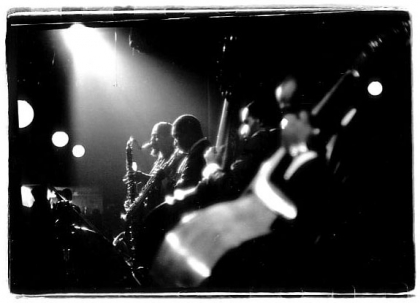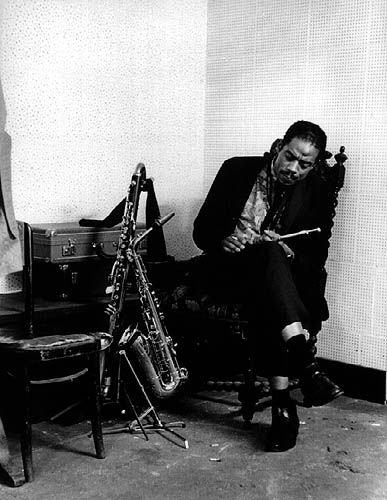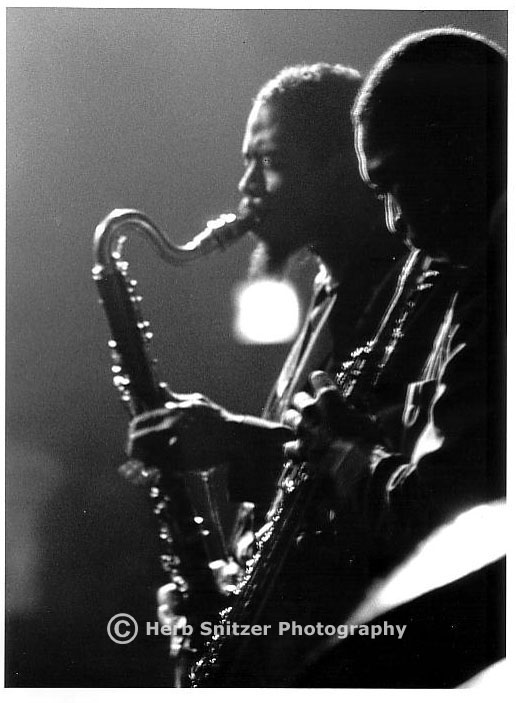JOHN COLTRANE / “Spiritual”

In 1961 when these two tracks were recorded, I was just entering St. Augustine high school. By the time I graduated in 1964, the Trane was at full throttle. The interstellar express—outward bound, destination unknown.
At first I was afraid of Trane’s music.
I couldn’t understand it. I could tell there was something going on. I found the sounds more disconcerting than ugly. Early on I tried avoiding confronting the music much like one looks away from a beggar with no legs. In short order I figured out what it was. Why the sounds were frightening: the intensity.
Some of the older cats had gone to see Trane up at Vernon’s Chicken Shack on Louisiana Avenue, the one time Trane’s quartet played in New Orleans. I wasn’t legally old enough to go, but that wouldn’t have prevented me if I really, really had wanted to make the scene.
Truth be told, I wasn’t bold enough.
The guys told me Elvin Jones had come in before the set started and pulled out a hammer and some nails, and nailed his drum set to the stage. And they said when Elvin started wailing, everybody knew why the nails were necessary. I don’t remember what they said about the music. But any music for which a hammer is required had to be something else. That kind of intensity was unprecedented.
Coltrane very precisely mirrored the intensity of the Black Power movement that was right around the corner about to jump off full blown seemingly out of nowhere. Coltrane was our soundtrack in a futuristic way. Where he and his band mates went with their axes we were about to follow. Rather than musical instruments we would have guns and pens, rather than playing gigs we were doing community organizing work and operating independent schools. But it was the same song.
Coltrane was pushing us out into the world. Trane's album Africa Brass anchored us to the continent. But Trane had also done Bahia. “Buy-what?” some of us said, scurrying to a map to find out where Brazil was. I mean we knew it was in South America, but we didn’t know specifically where. In another decade I would be troding the streets of Bahia. I don’t know if Trane ever went there. But I know he took us all there, and took us bunches of other places too.
Like India. “India” was a tremendous revelation to me. At that time I had no conception of Black people in India. Here I was shortly to graduate from high school and ignorant of basic geography and anthropology. Fortunately, I learned quickly.
I am saying that for me, coming of age in the sixties, digging on this jazz was far, far more than music appreciation. Trane and so many other master musicians were literally giving us young heads entrée to the entire planet—and don’t mention Sun Ra taking us for a ride to other galaxies.
Musically, what I remember is that Eric Dolphy got to me before Trane did. I could easily hear what Dolphy was doing. But then, Dolphy had this vocalizing thing going in his sound. Sounded like a preacher. And I knew all about that.
Plus, Dolphy was handling up on that bass clarinet. Playing the supposedly difficult instrument like it was a gigantic piece of licorice, just a twisting and turning, and note stretching, and licking it at both ends of the sonic spectrum.
I was amazed to learn that Elvin Jones was not particularly fond of the way Eric played, but then again I’m not too sure Elvin was crazy about Pharoah either.
After years of listening (yes, I said “years”—if you are only going to devote mere hours to listening to Trane you might as well not even start), anyway, I believe that the reason Trane hired Dolphy and later on Pharoah was that Trane missed the echo that another horn provided, an echo that the piano couldn’t give Coltrane, especially once Trane left the ground. Fixed-note instruments could not follow, or that’s the conclusion I came to.
Eric Dolphy was perfect in a number of ways, not the least of which was that Dolphy was as strong, if not stronger, as a technician, plus, Eric was a multi-instrumentalist. The alto was Dolphy’s main horn—you only had to hear him once to be able to forever recognize Dolphy’s alto sound.
What my man did with the flute entered another realm altogether. Bird-like is the easiest and most accurate description. Dolphy changed my mind concerning what a flute could do.
So what you had was an adventurous young man who was technically Trane’s equal, which is sort of like saying imagine Einstein’s work if he had somebody to play off of on a regular. Like Einstein understood the higher realms of physics, Dolphy and Trane had deciphered sound.
I could be mistaken, but I believe the Impressions album dropped first, some time in 1963 or thereabouts and Live At The Village Vanguard followed a few months after. “India” was on Impressions and certainly impressed everybody, especially the two bass line up of Jimmy Garrison and Reggie Workman, which offered a whole new way to listen to harmony, sort of a harmonic drum choir because in the new music the bass functioned as a time keeper as much, and even more so, than as a harmonic instrument. The hipness of “India” not withstanding, most of us were blown away by the title cut, “Impressions,” which was Coltrane’s twist on Miles’ “So What.”
What woke me up, however, was “Spiritual.” Reggie Workman’s loping bass line, the churn of Elvin’s drums, the singing quality of the lines, the clarity of McCoy’s chords, the muscle of Dolphy’s bass clarinet contrasted to the switch-blade sharpness of Trane’s soprano saxophone. I loved it then and love it now, which is, of course, why I’ve selected it as the featured track.
At that moment, back then, laying on the sofa, under an open window, I was swept up in a spiritual rapture. I’d play the song over and over—just like right now, while I’m writing this I started “Spiritual” over again for the fourth time!
One more thing I need to say: a lot of people jocking Trane today, but you see back in the early sixties a bunch of people, especially establishment jazz critics, hated Coltrane and absolutely detested Eric Dolphy.
They even went so far as to label Trane’s music “anti-jazz.”
People can play like they hip decades later but I have not forgotten the reviews and articles in Downbeat magazine. I have not forgotten that Trane was accused of destroying jazz.
Coltrane’s decision to call his radical quarter-hour solo “Chasin’ The Trane” seemed to me an appropriate summation of what we all were doing: some of us trying to catch up and climb aboard, others vainly trying to flag down the conductor and get him to turn around, or at least stop for a minute. Notice, the title is “Chasin’ the Trane” and not “Catchin’ The Trane.”
But then again, to be fair, revolutions—the overthrow of the existing social order—are always, always a frightening actuality to see hurling full force at you and you have maybe a minute or so (at least it seems that you are being rushed to make a judgment), and you have to decide whether to hop aboard and leave behind everything you already know or to stand back and hope the tumult passes without doing you any harm.
By the time I received my diploma, I was comfortably aboard the Trane and all the naysayers behind us braying like donkeys were fading quickly into oblivion. I could see those critics vainly flapping their arms, their mouths moving, shouting at us but all I could hear was Trane and that was all I wanted to hear: something new, something bold, black and unstoppable; the beautiful noise of my future being born.
—Kalamu ya Salaam
Note: instead of buying two albums, you can now get the master takes of “India” and “Spiritual,” plus “Impressions,” “Chasin’ the Trane” and “Softly As In A Morning Sunrise” on one album: Live at The Village Vanguard - The Master Takes.
This entry was posted on Monday, March 30th, 2009 at 4:20 am and is filed under Classic. You can follow any responses to this entry through the RSS 2.0 feed. You can leave a response, or trackback from your own site.
One Response to “JOHN COLTRANE / “Spiritual””
March 30th, 2009 at 7:33 pm
Thanks for this but let me add the thanks a friend in Kingston Jamaica returned when I sent him here- “I remember listening to this track on whatever album it was originally on with Kenny Johnson. On the album the out of time section at the beginning was even slower and went on for a while. Then Elvin Jones slowly brings in the beat. It was so cool when he finely started cooking that we both burst out laughing. We must have been loaded. Thanks for the memory!”
Leave a Reply
| top |